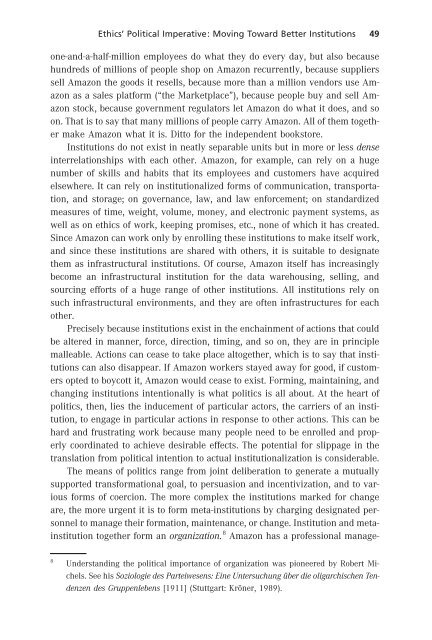Piet Naudé | Michael Welker | John Witte, Jr. (Eds.): The Impact of Political Economy (Leseprobe)
In our late modern pluralistic societies, there are tensions and complementarities between a plurality of individual and social claims and activities to shape societal life and a constructive pluralism of what is known as social systems. The latter provide normative codes and powers emanating from the areas of law, religion, the family, the market, the media, education, academic research, health care, defense and politics. A better understanding and steering of this complex division of powers is crucial for the common good and for freedom and peace. In this volume, a multi-disciplinary team of experts from Germany, Italy, Australia, the UK, the USA, and South Africa bring their conceptual, empirical and historical insights to bear in three broad sections: »The moral dimension of social systems«; »The interaction of religion, law and education with political systems«; and »The moral (mal)-formation evident in case studies on the global financial crisis and social media«.
In our late modern pluralistic societies, there are tensions and complementarities between a plurality of individual and social claims and activities to shape societal life and a constructive pluralism of what is known as social systems. The latter provide normative codes and powers emanating from the areas of law, religion, the family, the market, the media, education, academic research, health care, defense and politics. A better understanding and steering of this complex division of powers is crucial for the common good and for freedom and peace.
In this volume, a multi-disciplinary team of experts from Germany, Italy, Australia, the UK, the USA, and South Africa bring their conceptual, empirical and historical insights to bear in three broad sections: »The moral dimension of social systems«; »The interaction of religion, law and education with political systems«; and »The moral (mal)-formation evident in case studies on the global financial crisis and social media«.
Create successful ePaper yourself
Turn your PDF publications into a flip-book with our unique Google optimized e-Paper software.
Ethics’ <strong>Political</strong> Imperative: Moving Toward Better Institutions 49<br />
one-and-a-half-million employees dowhat they do every day, but also because<br />
hundreds <strong>of</strong> millions <strong>of</strong> people shop on Amazon recurrently, because suppliers<br />
sell Amazon the goods it resells, because more than amillion vendors use Amazon<br />
as asales platform (“the Marketplace”), because people buy and sell Amazon<br />
stock, because government regulators let Amazon do what it does, and so<br />
on. That is to say that many millions <strong>of</strong> people carry Amazon.All <strong>of</strong> them together<br />
make Amazon what it is. Ditto for the independent bookstore.<br />
Institutions do not exist in neatly separable units but in more or less dense<br />
interrelationships with each other. Amazon, for example, can rely on ahuge<br />
number <strong>of</strong>skills and habits that its employees and customers have acquired<br />
elsewhere. It can rely on institutionalized forms <strong>of</strong> communication, transportation,<br />
and storage; on governance, law, and law enforcement; on standardized<br />
measures <strong>of</strong> time, weight, volume, money, and electronic payment systems, as<br />
well as on ethics <strong>of</strong> work, keeping promises, etc., none <strong>of</strong> which it has created.<br />
Since Amazon can work only by enrolling these institutions to make itself work,<br />
and since these institutions are shared with others, it is suitable to designate<br />
them as infrastructural institutions. Of course, Amazon itself has increasingly<br />
become an infrastructural institution for the data warehousing, selling, and<br />
sourcing efforts <strong>of</strong> ahuge range <strong>of</strong> other institutions. All institutions rely on<br />
such infrastructural environments, and they are <strong>of</strong>ten infrastructures for each<br />
other.<br />
Preciselybecause institutions exist in the enchainment <strong>of</strong> actions that could<br />
be altered in manner, force, direction, timing, and so on, they are in principle<br />
malleable. Actions can cease to take place altogether, which is to say that institutions<br />
can also disappear. IfAmazon workers stayed away for good, if customers<br />
opted to boycott it, Amazon would cease to exist. Forming, maintaining, and<br />
changing institutions intentionally is what politics is all about. At the heart <strong>of</strong><br />
politics, then, lies the inducement <strong>of</strong> particular actors, the carriers <strong>of</strong> an institution,<br />
to engage inparticular actions in response to other actions. This can be<br />
hard and frustrating work because many people need to be enrolled and properly<br />
coordinated toachieve desirable effects. <strong>The</strong> potential for slippage in the<br />
translation from political intention to actual institutionalization is considerable.<br />
<strong>The</strong> means <strong>of</strong> politics range from joint deliberation to generate amutually<br />
supported transformational goal, to persuasion and incentivization, and to various<br />
forms <strong>of</strong> coercion. <strong>The</strong> more complex the institutions marked for change<br />
are, the more urgent it is to form meta-institutions by charging designated personnel<br />
to manage their formation, maintenance, or change. Institution and metainstitution<br />
together form an organization. 8 Amazon has apr<strong>of</strong>essional manage-<br />
8<br />
Understanding the political importance <strong>of</strong> organization was pioneered by Robert Michels.<br />
See his Soziologie des Parteiwesens: Eine Untersuchung über die oligarchischen Tendenzen<br />
des Gruppenlebens [1911] (Stuttgart: Kröner, 1989).
















